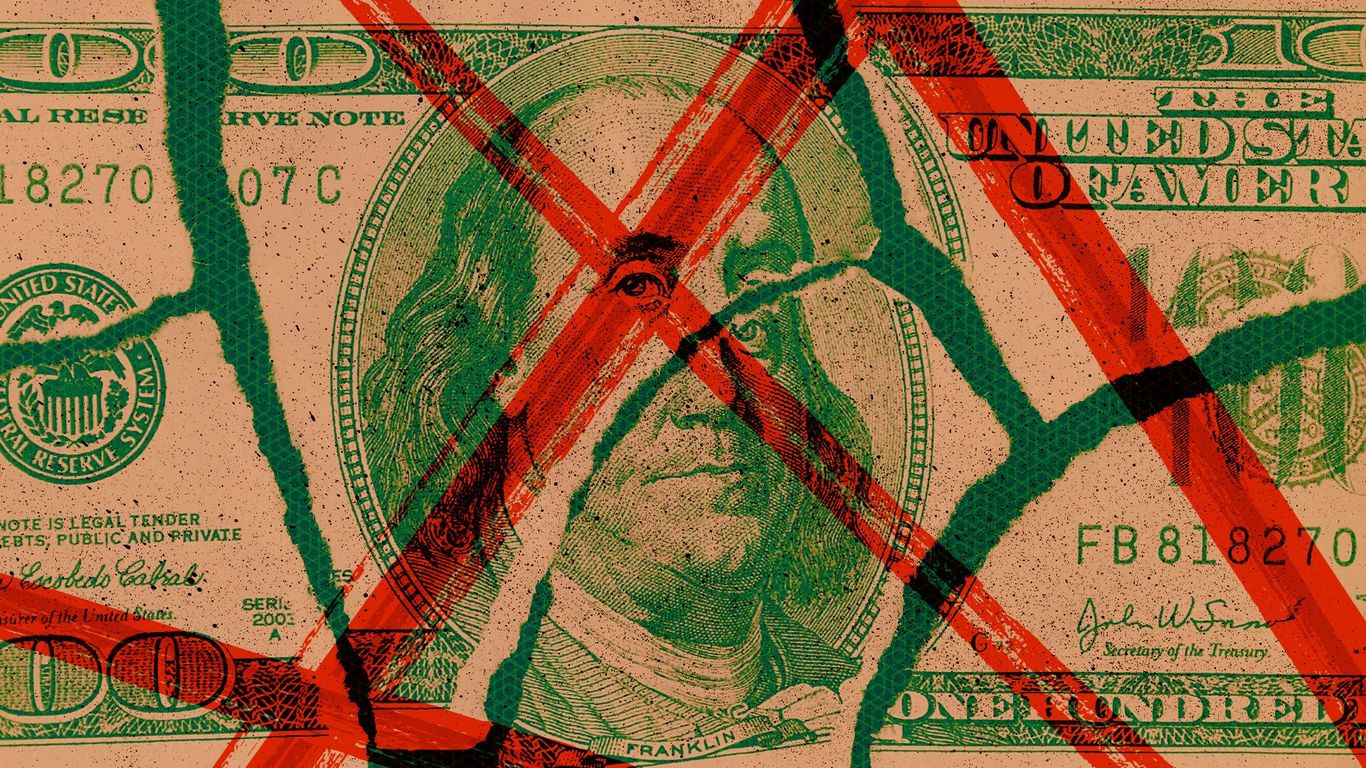A truly enormous shock is needed to tip the entire global economy into recession. Since World War II, there have been two such events — the financial crisis of 2008-9, and the COVID-19 pandemic of 2020. Why it matters: Trump's "Liberation Day" tariffs, if they're kept in place and especially if they face retaliation from targeted nations, could be the third such economic earthquake in 17 years.
Follow the money: The U.S. imported $3.

3 trillion of goods in 2024 — that's more than $25,000 per household. If the new tariffs work out to an average of 29%, per Evercore, then U.S.
importers would have to pay about $1 trillion in tariffs per year, or $7,300 per household. Realistically, that would never happen — many goods will just not get imported any more, creating shortages and large price hikes. But if U.
S. imports plunge, that would remove a key driver of the global economy, especially for export-dependent countries like Germany and China. Zoom in: The 54% tariff on imports from China is particularly punitive.
China exports plenty of high-tech goods like iPhones, but it's also the engine that provides affordable goods to millions of financially stretched families on low incomes. As such, the China tariff alone could cause a significant increase in poverty.Zoom out: The past 75 years or so of globalization have created a complex web of interdependent economies — which explains sayings like "when the United States sneezes, Latin America catches pneumonia.
"If U.S. tariffs cause our major trading partners to slide into recession, that would devastate U.
S. exports — $2.1 trillion for goods last year, plus another $1.
1 trillion in services. And that's even before those partners start implementing retaliatory tariffs."This is a game changer for the global economy," wrote Fitch economist Olu Sonola in a note Wednesday.
"Many countries will likely end up in a recession."Others agreed. "These policies, if sustained, would likely push the US and global economy into recession this year," wrote JPMorgan analysts in a note on Wednesday.
Between the lines: Global stocks fell sharply on the Trump announcement — but not as much as they would if they believed these tariffs will be fully implemented and will be here to stay."One lesson from the first few months of the Trump presidency is that you have to let news cure a little before you take it seriously," Matthew Hougan, chief investment officer at Bitwise Asset Management, tells Axios.The bottom line: It's almost impossible to overstate the sheer magnitude of the announced tariffs — and the degree to which they could devastate the global economy.
Whether they really get implemented, however, remains to be seen.Brady Dale contributed..
How Trump tariffs could cause a global recession

A truly enormous shock is needed to tip the entire global economy into recession. Since World War II, there have been two such events — the financial crisis of 2008-9, and the COVID-19 pandemic of 2020. Why it matters: Trump's "Liberation Day" tariffs, if they're kept in place and especially if they face retaliation from targeted nations, could be the third such economic earthquake in 17 years. Follow the money: The U.S. imported $3.3 trillion of goods in 2024 — that's more than $25,000 per household. If the new tariffs work out to an average of 29%, per Evercore, then U.S. importers would have to pay about $1 trillion in tariffs per year, or $7,300 per household. Realistically, that would never happen — many goods will just not get imported any more, creating shortages and large price hikes. But if U.S. imports plunge, that would remove a key driver of the global economy, especially for export-dependent countries like Germany and China. Zoom in: The 54% tariff on imports from China is particularly punitive.China exports plenty of high-tech goods like iPhones, but it's also the engine that provides affordable goods to millions of financially stretched families on low incomes. As such, the China tariff alone could cause a significant increase in poverty.Zoom out: The past 75 years or so of globalization have created a complex web of interdependent economies — which explains sayings like "when the United States sneezes, Latin America catches pneumonia."If U.S. tariffs cause our major trading partners to slide into recession, that would devastate U.S. exports — $2.1 trillion for goods last year, plus another $1.1 trillion in services. And that's even before those partners start implementing retaliatory tariffs."This is a game changer for the global economy," wrote Fitch economist Olu Sonola in a note Wednesday."Many countries will likely end up in a recession."Others agreed. "These policies, if sustained, would likely push the US and global economy into recession this year," wrote JPMorgan analysts in a note on Wednesday.Between the lines: Global stocks fell sharply on the Trump announcement — but not as much as they would if they believed these tariffs will be fully implemented and will be here to stay."One lesson from the first few months of the Trump presidency is that you have to let news cure a little before you take it seriously," Matthew Hougan, chief investment officer at Bitwise Asset Management, tells Axios.The bottom line: It's almost impossible to overstate the sheer magnitude of the announced tariffs — and the degree to which they could devastate the global economy. Whether they really get implemented, however, remains to be seen.Brady Dale contributed.














